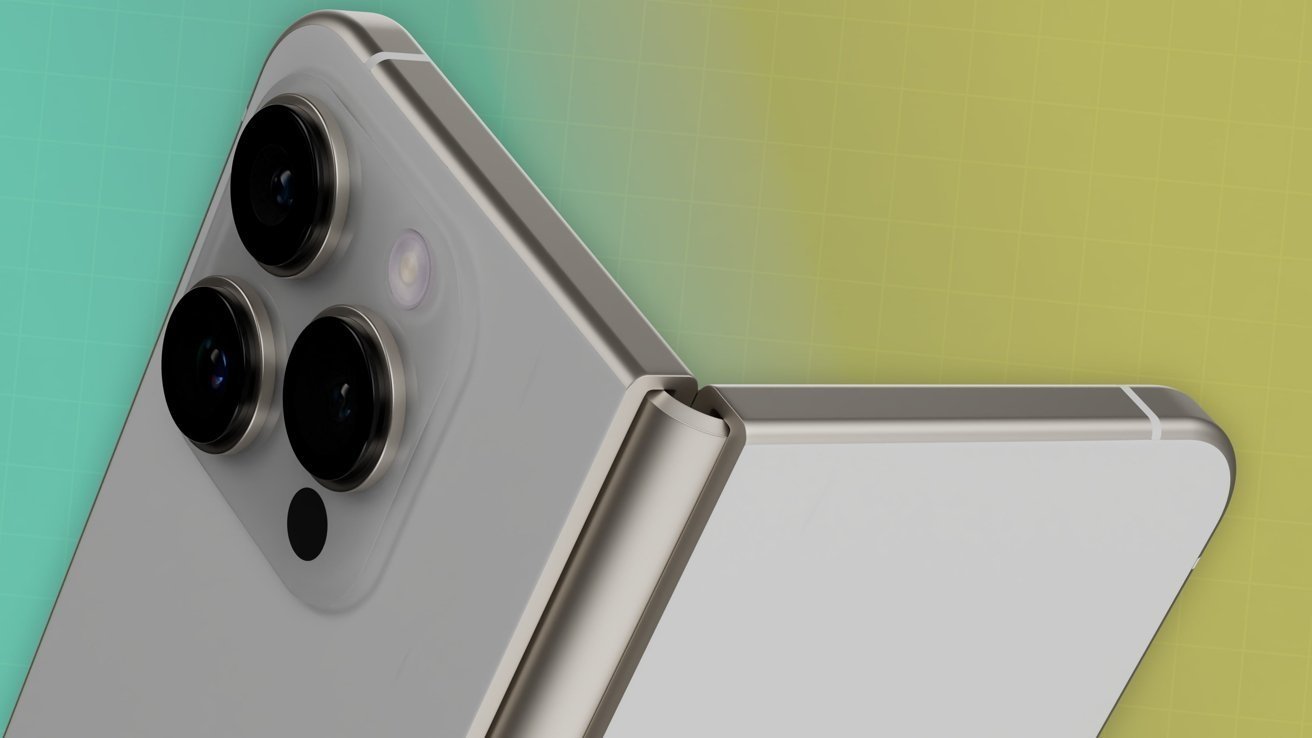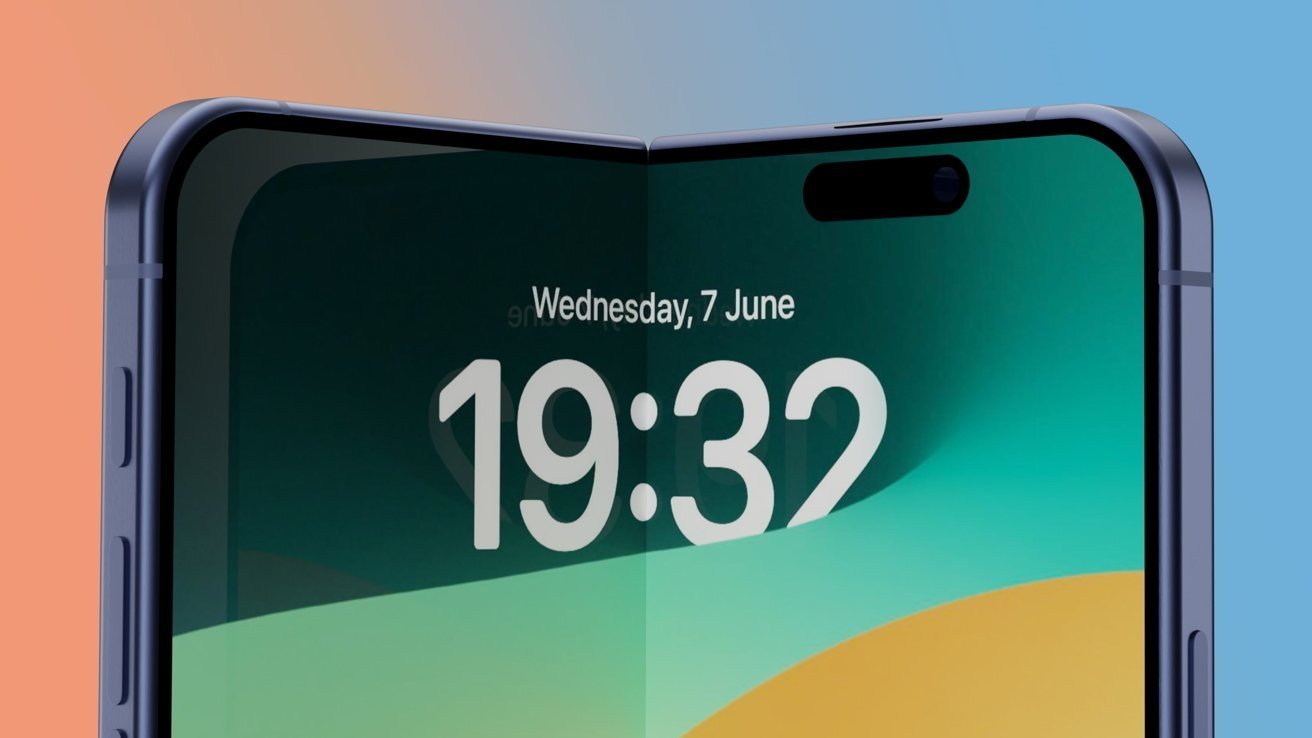History repeating: Why Apple is so late to the foldable phone market
Following the release of the well-reviewed Samsung Galaxy Fold 7, a familiar question remains: where's the iPhone Fold? The answer is complicated.

A possible render of the iPhone Fold - Image Credit: AppleInsider
The lack of an iPhone Fold in the lineup continues to be puzzling to some. The iPhone 17 will launch next month, and it'll be very similar to the outgoing iPhone 16.
Because of that, it's understandable that some might look elsewhere for something a little more exciting. For those tired of buying slabs of metal and glass, a foldable phone offers something new. Something Apple doesn't offer at all.
Foldable phones are increasing in popularity, rather than being a technological oddity. Samsung, Motorola, OnePlus, Honor, and others all have phones with a bendable screen. Some have multiple.
But with Apple now expected to launch the first foldable iPhone in 2026, the reasons for its relative tardiness are worth considering.
Apple's entering a market late is nothing new. In fact, it could just be its superpower.
Good foldable phones are just hard to make
It might seem obvious, but it's a valid point. Making a foldable iPhone is more difficult than making a normal one.
Dealing with the complexities involved with attaching two displays to a single device where the screen bends in the middle is just the beginning. It's hard enough to keep an iPhone in one piece as things are. Now imagine if it were foldable.
On the hardware front, the phone needs to be able to withstand thousands upon thousands of folds and unfolds. Tests of foldable phones in the past have seen them fail alarmingly quickly.
Reports of hinges creaking once worn in or simply refusing to fully open aren't uncommon. Heavier use can affect the crease at the center of a foldable's display, too.
Ultimately, hinges wear and that's bad news when you use it multiple times each and every day.
Hinges also have tons of tiny moving parts, which makes protecting against dust and water ingress difficult. It was impossible, initially, and foldable phones were not water-resistant. Only recently have we seen that change.
The hinge is one thing. The glass is another, and it's no secret that glass isn't fond of bending.

Render of a possible iPhone Fold - Source AppleInsider
Early foldable phones suffered from a range of display issues, as Samsung can attest. Some creases turned into cracks over time, requiring the display to be replaced.
Considering Apple doesn't want a crease in the first place, it probably really doesn't want one that turns into a crack. And neither do customers.
Companies have been placing plastic films atop their foldable glass displays to help protect them, a fix that caused its own problems. Multiple early adopters (including YouTubers with review units) thought the plastic was a factory-fitted screen protector. So they removed it.
The result was a broken display. The situation became so bad that foldable phone makers started putting messages on new phone displays telling people not to remove the plastic film.
If you looked under the word "compromised" in the dictionary, early foldable displays would be there.
Software complications
Then, there's the software. Google has spent years making Android play nicely with a device that has two displays of different dimensions.
Questions remain over how Apple will approach things. When closed, the iPhone Fold will function like any other iPhone.
But open it up and you'll be presented with an iPad mini-like display -- assuming the leaks are accurate, of course. Suddenly, the existing iOS way of doing things doesn't quite work.
Will Apple go with a combination of iOS and iPadOS? We'll hopefully get an answer to that question next year. It's likely one that Apple's engineers have been struggling with, too.
The addition of what would likely be two new display sizes, resolutions, and ratios is another aspect worth pondering. Developers of iPhone and iPad apps have the luxury of targeting a set number of display sizes. That's something Android app developers would kill for.
While developers would ultimately get to grips with the new displays, it's an additional complication. Will developers need to make an iPhone version, an iPad version, a Mac version, and a foldable iPhone version of their apps?
They'd certainly hope not, and this might be where Apple does some graphical magic to lighten the load -- time will tell.
Just imagine the price
We'll just say it: iPhones aren't cheap. Even the cheapest models aren't what we'd call cheap. Now imagine one that folds.
The prices of foldable phones have finally started to fall, but the premium models still demand a premium price.
The recently released Samsung Galaxy Z Fold 7 is a solid bit of kit. But it starts at a mind-boggling $2,000 for a 256GB model.
Upgrade to the one with 1TB of storage, and you'll pay $2,420. That's iPad Pro money. Forget that, it's MacBook Pro money.
We can expect the fabled iPhone Fold to cost around the same amount of money. That figure certainly wouldn't have been lower had Apple entered the fray a few years ago -- and the phone would have been worse to boot.
Ultimately, Apple isn't hurting for cash. It doesn't need to join markets it isn't sure about, and foldable phones have been one of those markets in recent years.
Why be first when you can be the best?
The Mac wasn't the first personal computer, and the iPod wasn't the first personal MP3 player. The iPhone wasn't the first smartphone, and the iPad wasn't the first tablet.
The Apple Vision Pro wasn't the first mixed-reality headset, and the Apple Watch wasn't the first smartwatch, either.
But plenty of them took their respective categories by storm, often becoming the de facto option for buyers.
And Apple knows it.
Speaking during an all-hands meeting reported on by Bloomberg, Apple CEO Tim Cook admitted that Apple is often late to the party.
"We've rarely been first," Cook told those watching in the Steve Jobs Theater at Apple Park. But he went on to add that Apple invented the "modern" versions of those devices.
At the time, Cook was speaking about AI, but he could easily have been discussing foldable phones. He might even revisit the line when he unveils the iPhone Fold next year.
Apple regularly waits for a category to mature, allowing the likes of Samsung to fail and fail hard before entering. Early foldable phones were terrible products, and they only came into their own in the last couple of years.
Now, Apple can learn from Samsung's mistakes. It'll have a display with a minimal crease, if any. The iPhone Fold will be water-resistant. It'll have software that works and capable cameras.
None of that would have happened if Apple had launched a foldable iPhone five years ago, or even two years ago.
But when it does launch one in 2026? It'll not only be the best iPhone ever, but likely the best foldable phone, too.
Read on AppleInsider


Comments
I think the mind frame with this audience is if Apple didn't make it it's junk. This was the same talk with the phablet, the same reason people here try to downplay AI and ChatGPT as some useless chatbot and Apple isn't behind because it's just that when in reality it has many beneficial use cases and looking at it as one thing is short minded.
I can tell you having Gemini on my phone now and it being plugged into many apps especially Google's is very mind-blowing and useful. And Apple is definitely behind the curve on AI, having the iPhone as a plug-in for other AI services instead of Apple having their own is a failure on Apples part.
If you haven’t noticed, LQMT has doubled in stock price in the last three months. It has long been rumored that Liquidmetal Technologies is going to provide the hinges for the iPhone Fold.
For you savvy investors out there, it might be worth it to put a few bucks into the stock. Nothing crazy, but you might 10x or 20x your money in the next 12 months.
It’s also rumored, but yet to be reported, that the 20th anniversary of the iPhone will introduce wireless charging. Apple has been in deep conversations with Energous Corp (symbol: WATT) for over a decade. Their technology and patents are ripe for Apple to acquire.